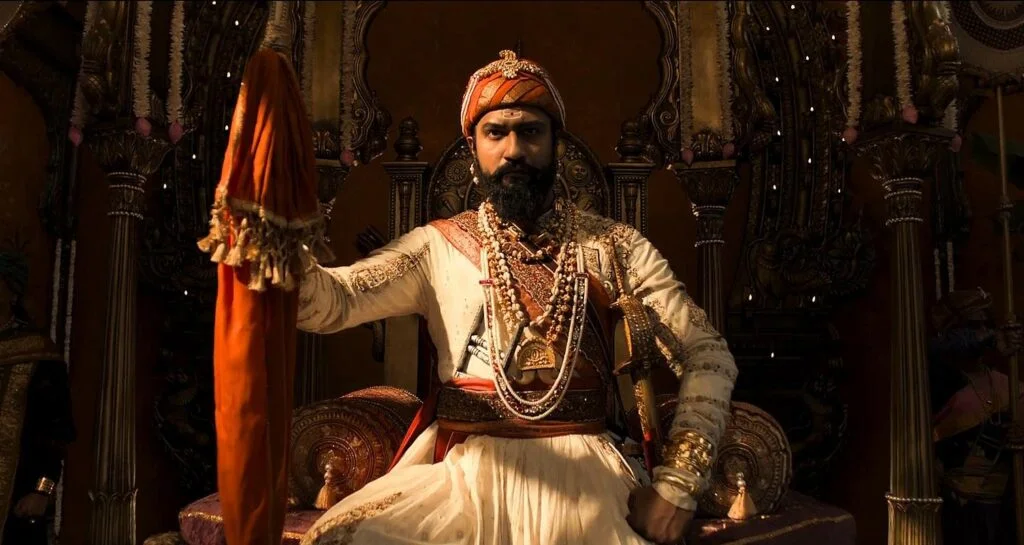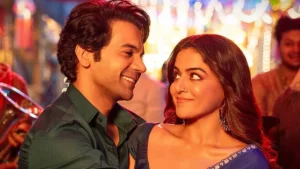
It’s 2025, and Bollywood is in a creative coma while the cultural fabric of India frays at the seams. As history gets conveniently rewritten across various fronts, mainstream cinema seems to have misplaced its passion – perhaps lost under a pile of box office receipts. What was once considered an art form now exists largely to pander to populist, divisive sentiments while raking in cash. The latest example is Laxman Utekar’s grand spectacle, Chhaava, a biopic on Chhatrapati Sambhaji Maharaj, one of Maharashtra’s most revered historical figures. Starring Vicky Kaushal in the lead role, the film plunges headfirst into an abyss of sound and fury, ultimately doing a spectacular disservice to the legacy it claims to honor.
While Chhatrapati Shivaji Maharaj’s story is well-known, Sambhaji’s narrative is largely unexplored in Hindi cinema. Chhaava, which is adapted from Shivaji Sawant’s book of the same name, makes no real effort at storytelling either. Instead, Utekar’s film unfolds as a series of battle sequences between the Maratha king and a villainous Aurangzeb (Akshaye Khanna) with no cohesive plot to keep you invested. As a result, Chhaava feels like a video game – visually stunning at times with impressive cinematography but frustrating in its execution, especially with an original score that struggles to decide whether it wants to be Sufi, Rajput, or a modern 2025 experimental jam.
Amid the deafening sound design (which is second only to 2024’s Kanguva), the supporting characters in Chhaava are mere props. The most glaring examples are the film’s female characters. Yesubai (Rashmika Mandanna), Sambhaji’s headstrong wife, is sidelined to resemble a devoted disciple. Divya Dutta’s cunning Soyarabai is shipped off the screenplay before her character can be of real impact. Diana Penty, as Padshah Begum Zeenat-un-Nisa, exists primarily to deliver a handful of lines besides staring in disbelief. But at least they’re all nattily dressed – offering brief visual relief from the gory sausage fest the film becomes.
There’s also the inevitable agenda-baiting in Chhaava. Aurangzeb (who gets a cute pet name, Aurang) speaks about conversion, while Sambhaji proclaims his commitment to religious coexistence. Objectivity goes out the window as the Mughal emperor’s violence is exaggerated, while the protagonist’s similar actions are either downplayed or omitted entirely. The deliberate saffronization extends to small details such as depicting the soldiers’ diet as strictly vegetarian – despite historical accounts of Indian warriors consuming non-vegetarian food. In the film’s universe, no obstacle stands a chance in front of a ‘Jai Bhawani’ war cry. Sambhaji Maharaj’s vision of Swaraj, too, is diluted by dialogues that feel like a corporate boss urging employees to focus on the big picture instead of salary hikes. Chhaava repeatedly reinforces the emperor’s devotion to his mother, with fleeting glimpses of young boys alongside their mothers. But can a ruler truly exist without a single shade of grey? Ironically, Utekar’s film emerges in an era where real history is more accessible than ever, making any attempt at distortion an exercise in futility.
ALSO READ: ‘Panipat’ review – An impersonal yet partly bearable war epic
Chhaava, beneath its faux patriotic veneer, aims to be a typical commercial potboiler. Yet it relentlessly tests the limits of patience in every running minute. A staple of this genre is its music, but here, A.R. Rahman’s songs are shockingly lifeless, while the background score drains whatever little essence the narrative might have had. Whether Utekar was too awestruck by the composer to demand better work is anyone’s guess, but a significant portion of the film is compromised by a soundscape that feels anything but Maratha. I am forced to believe the maestro took a solid nap while a rookie assistant whipped up ‘Jaane Tu‘, which could have been a modern-day ‘Jashn-e-Bahaara’. The action sequences, predictably overloaded with VFX, are decently mounted and shot (DOP: Saurabh Goswami). Yet, sans a valid plot and genuine emotions, Chhaava’s roar lands with the impact of a housecat throwing a tantrum. As for the last 15 minutes, they serve as an endurance test for anyone who isn’t a fan of unfiltered violence – because the film leaves nothing to the imagination.
Vicky Kaushal tries so hard that we almost feel like crying – purely because both he and the warrior king deserved a far better film. The film’s ear-splitting decibel levels find some solace in Kaushal’s committed portrayal of Sambhaji, but we know he’s capable of so much more. It only makes us wonder how charming and nuanced the real Chhatrapati must have been. Akshaye Khanna, on the other hand, seems fully aware of the film’s tone and likely laughed all the way to the bank as he sleepwalked through Chhaava. It’s a quietly fiery performance, though he barely had to break a sweat to deliver it. Vineet Kumar Singh is handed a potentially intriguing role which, thanks to an abysmal screenplay, never registers. The language is an odd mix of Hindi and Urdu, with barely any trace of the ruler’s Marathi roots. Surprisingly, Rashmika Mandanna’s thick South Indian accent feels like the least of the film’s problems – especially in a world where every character speaks a different lingo.
I initially wondered how Laxman Utekar – who has yet to make a good film- was deemed the right choice to helm a historical drama, even if it leaned towards propaganda or bias. Chhaava quickly put my doubts to rest – not by proving me wrong, but by confirming that this isn’t a historical drama in the first place. It is just another glorified action flick that reduces a formidable Maratha warrior to a relentless killing machine. By the end of it, Utekar still doesn’t have a good film to his name, and I’ve lost 161 minutes watching it – plus another 90 minutes writing and editing this review. No rocket science is needed to figure out who the loser is here… and unfortunately, it’s not the filmmaker.
Rating: ★★

